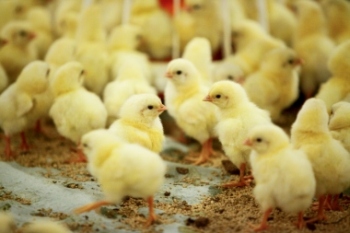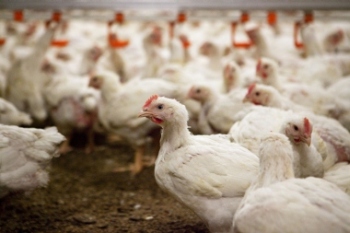HKScan has conducted and documented a comprehensive study of every stage and sub-area in its Finnish broiler production chain, from bird breeding to production of broiler products. The Group’s mission is to increase and share information on the different stages of its chain and to continue playing an active role in developing Nordic primary production, maintaining competitiveness, and preparing legislation for the sector.
The study is a timely response to a stakeholder dialogue conducted by HKScan this spring, which revealed that HKScan stakeholders, such as personnel, customers, consumers, producers, media and other business partners, regard animal welfare as one of the most important areas of corporate responsibility. Other animal welfare-related things listed as important included “control of animal diseases, such as salmonella”, “proper treatment of production animals”, “animal welfare in primary production”, and “proper treatment of animals at slaughterhouses”.
Surprising amount of reporting in primary production
“We wanted to shed light on every stage of our broiler production chain and sharpen our stakeholders’ comprehensive picture of animal production processes, the related responsibilities, obligations, voluntary actions, accomplishments, and also development opportunities,” said HKScan’s CEO Hannu Kottonen speaking at the Okra Agricultural Fair in Oripää, Finland, on 2 July.

HKScan’s study included an analysis of the different stages of the production chain as well the EU and national regulations and their costs. It also investigated the different obligations of animal producers, like the amount of statutory and voluntary reporting related to e.g. animal health, animal disease protection (salmonella, among others), and the monitoring of animal welfare.
“Finnish broiler producers report to nearly ten different authorities. Producers regularly report to four different authorities: the Finnish Food Safety Authority Evira, and, in matters concerning animal health and feed, to veterinary inspectors, to the municipal veterinary department, and to the food industry. Noteworthy is that a significant part of the regular reporting exceeds statutory requirements,” says Kottonen.
Enhanced welfare through voluntary actions
HKScan’s study indicated that product safety and quality as well as animal health and welfare have been developed systematically, purposefully and cost efficiently with the broiler sector’s own voluntary actions. Significant benefits have been achieved at relatively low direct costs. “Few people realize just how clean Finnish broiler meat is. We have a zero-tolerance policy towards salmonella, and our production chain has been fully antibiotic-free in recent years, which is a rare achievement by global standards. HKScan’s policy on salmonella control in broiler production is much stricter than is required by legislation.” The scope of the study does not cover primary production’s and industry’s direct and indirect regulatory costs, such as disinfection and intervals, and the impacts of the plants’ own monitoring on productivity and earnings.
With strict control of the supply chain and result monitoring, animal health and welfare can be examined at the farm level. Broilers are floor-raised on e.g. peat moss; cages are not used during any stage of the growing process. The birds are raised with the same flock throughout their life and the growout houses are cleaned thoroughly before the next flock is brought into the growout house. This ensures clean and safe conditions and effective prevention of animal diseases.

In order to develop the broiler production chain, it is important to address the improvement targets revealed by the study: the multitude of different authorities to which primary producers must report to, the lack of conformity in practices and process times of different local authorities in Finland, the cumulative impact of overlapping statutory requirements throughout the production chain, and the failure of certain EU member states to uniformly adhere to the EU’s minimum requirements.
Competition is global – the purity of Finnish meat is an export asset
The food industry is Finland’s fourth largest sector of industry. The entire food production chain – from agriculture to the food processing industry – employs a workforce of over 300,000 in Finland, representing approximately 12 per cent of the working population. Although the food industry is globalizing rapidly, 82 per cent of Finnish foodstuffs are domestic in origin.
“The tough global competition in the meat industry is forcing Nordic animal producers and meat companies to examine their competitiveness more carefully. Producers and the industry today pay about four cents per broiler kilo in direct costs arising from regulations. We have pure, high-quality, responsibly-produced meat products, which have great potential as uniquely differentiated export products. I hope that politicians and officials can offer proactive measures and support for maintaining the vitality of domestic primary production and the food industry, for securing its competitiveness, and for eliminating obstacles to exports. Mandatory regulation must not be added to the Finnish meat chain, which has achieved outstanding quality-related results through legislative and especially its own voluntary actions,” said Kottonen in his speech.
HKScan plans to conduct corresponding studies for its pork and beef production chains.
For further information:
Hannu Kottonen, CEO, HKScan Group
Please submit a call-back request to Marja-Leena Dahlskog, SVP Communications, firstname.lastname@hkscan.com, tel. +358 (0)50 50 200 60.
HKScan is the leading Nordic meat expert. We sell, market and produce high-quality, responsibly-produced pork, beef, poultry and lamb products, processed meats and convenience foods under strong brand names. Our customers are the retail, food service, industrial and export sectors, and our home markets comprise Finland, Sweden, Denmark and the Baltics. We export to close to 50 countries. HKScan's net sales is EUR 2.1 billion and we have some 7 700 employees, making us one of the Europe's leading meat companies.

